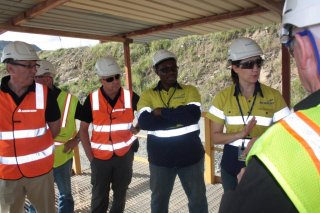 Over the past four years, the Australian Agency for International Development (AusAID) has supported 43 Ghanaians to undertake mining-related studies in Aus- tralia. This includes six participants studying at master’s degree level.
Over the past four years, the Australian Agency for International Development (AusAID) has supported 43 Ghanaians to undertake mining-related studies in Aus- tralia. This includes six participants studying at master’s degree level.
A study conducted by the Australia–African Partnerships Facility (AAPF) in September 2012, on the African mining and mining administration skills gap, identified that the main skills gaps in the mining sector in Ghana included general engineering, accounting and information technology skills. The mining-related courses provided under the Australia Awards scholarships are aimed at closing these skills gaps.
This forms part of the range of support that AusAid provides Ghana, in the form of the African Mining Vision (AMV), which aims to ensure transparent, equitable exploitation of mineral resources, underpinned by broad-based sustainable growth and socioeconomic development.
AusAID currently provides opportunities for short- and long-term courses to qualified Ghanaians working in key government Minis- tries and agencies related to the mining sector. It also provides targeted technical assistance interventions, aimed at building the capacity of the Large Taxpayers Office (LTO) in the Ghana Revenue Authority (GRA) to better manage the challenges of revenue collection in the mining sector.
This AusAID initiative reflects the Ghanaian government’s will to realise the aims of building individual capacity through targeted training and targeted technical assistance to support improved mining governance, including research and policy development.
African heads of State adopted the AMV at the 2009 African Union (AU) Summit in Sirte, Libya, following the October 2008 meeting of African Ministers responsible for mineral resources development. Accord- ing to the AU it is Africa’s own response to tackling the paradox of great mineral wealth existing side by side with pervasive poverty.
“Australia provides support to Ghana through a number of initiatives, which include training workshops, in Australia and Africa, as well as mining-specific Australia Awards scholarships for study in Australia, targeted technical assistance to support the improvement of mining governance, including research and policy development,” says AusAID head of development cooperation West Africa Zabeta Moutafis.
“In pursuing these areas of cooperation, AusAID seeks to focus on key policy issues that have been raised by African governments, including integrated planning; cadastre and geomapping; inspectorate functions; taxation and royalties and community development,” says Moutafis.
Under the AAPF, 30 Ghanaians were supported to participate in mining-related study tours and conferences in Australia and study tours in which Ghanaian decision-makers from key mining- and finance-related government institutions, nongovernmental representatives and private-sector representatives participated.
Together with their colleagues from other African countries, participants also went on general mining governance study tours and tours focusing on specific subjects, such as mining-related public financial management, mining and community development, African women in mining, technical and vocational training in mining, local procurement and infrastructure planning.
Ghana’s mining sector has made significant contributions to the growth of the economy since reforms commenced in the mid-1980s. However, concerns over the general management of the sector remain, with some critics arguing that Ghana has failed to reap sufficient benefits from mining activity.
“One area where Ghana’s management of its mining sector faces challenges – and where Australian support is being used – is in the administration of its fiscal regime,” states Moutafis.
For example, the GRA, which administers the fiscal regime in the mining sector, requires staff to be experienced tax administrators and to possess a solid understanding of the mining industry.
The challenges faced by the GRA are compounded by the fact that the government of Ghana is currently implementing a new mining fiscal regime.
“In response to the government’s requests, Australia has provided almost A$500 000 in targeted technical assistance to Ghana to increase the efficiency and effectiveness of revenue collection in the minerals sector,” says Moutafis.
This technical assistance will help the LTO to increase understanding of the unique issues facing the minerals sector, including the fiscal instruments that apply to it; increase the country’s ability to ensure taxation compliance of the sector through a balance of service and enforcement, and identify capacity gaps with respect to the administration of Ghana’s new mining fiscal regime.
The vocational training and infrastructure planning activity AusAID engages in is an innovative approach that brings together government and private-sector stakeholders in a number of African countries, in order to build the capacity of local service agencies, says Moutafis.
“Six Ghanaians from relevant mining, infra- structure and education authorities are parti- cipating in this programme to increase their capacity to design and prepare infrastructure projects, which support extractive industries and community development,” says Moutafis.
“This pilot programme, whereby selected senior and mid-level participants will receive peer-to-peer vocational training consists of programmes which are supported by structured action learning experiences, with the intent to establish a growing network of technically skilled officials in Africa within the infrastructure sector,” he concludes.























